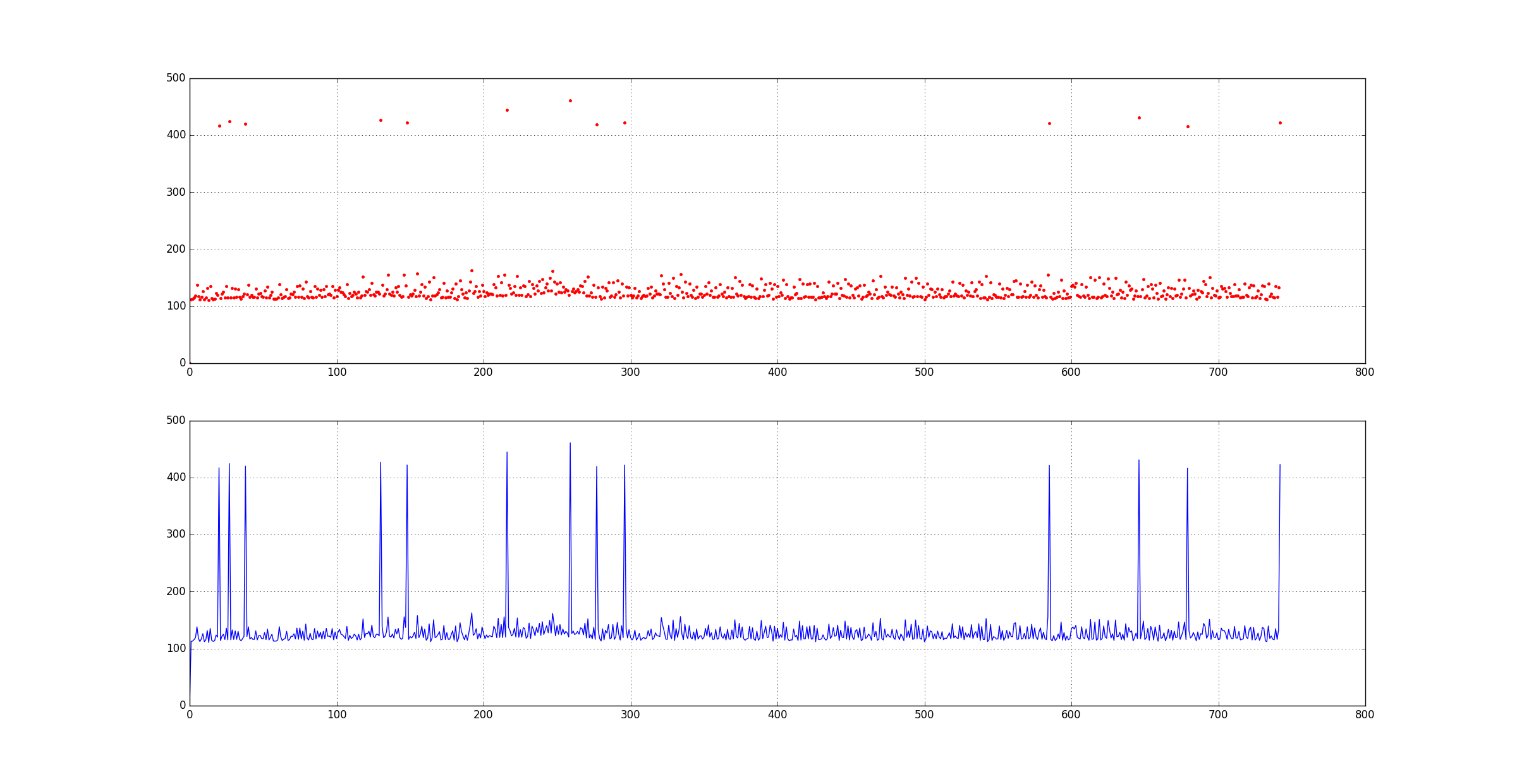python处理日志文件
2019-04-11 11:10 Eagel 阅读(12465) 评论(0) 收藏 举报python处理日志文件
1 打开日志文件
虽然,日志文件的后缀为.log,但是基本上与文本文件没有区别,按照一般读取文本文件的方式打开即可:
fp =open("e:\\data.log") fp.close()
应用示例:

fp =open("e:\\data.log") for line in fp.readlines(): # 遍历每一行 filename = line[:14] # 每行取前14个字母,作为下面新建文件的名称 content = line[14:] # 每行取第15个字符后的所有字符,作为新建文件的内容 with open("e:\\"+filename+".txt","w") as fp2: fp2.write(content+"\n") fp.close()
2 提取目标信息
日志文件每行字符串由空格分隔,例如对第1个字段(IP、时间等)感兴趣,则使用split()方法对每行字符串进行切片,将第1个子字符串存到列表里,用于下一步处理。
示例代码:
#!/usr/bin/python # -*- coding: UTF-8 -*- txt = "Google#Runoob#Taobao#Facebook" # 第二个参数为 1,返回两个参数列表 x = txt.split("#", 1) print x
输出结果:
['Google', 'Runoob#Taobao#Facebook']
3 统计分析
在上一步骤中,将感兴趣的目标信息存储到列表中,现使用python统计列表元素出现的次数,参考链接[3]提供了很多实现方法[4],本文使用collections[5]中的most_common()方法。
示例:
from collections import Counter def counter(arr): return Counter(arr).most_common(2) # 返回出现频率最高的两个数 # 结果:[(2, 3), (1, 2)]
4 后记
完整代码(待整理):

# -*- coding: utf-8 -*- """ Created on Thu Apr 11 08:24:02 2019 @author: Green """ #import sys #import time from collections import Counter #import pyExcel import xlwt fp =open("d:\\aa.log") #print len(fp.readlines()) # 3593512 mycount = 0 IPlists = [] for line in fp.readlines(): # control times==================== #mycount += 1 #if mycount > 100: # break #================================== data = line.split(" ") # 依空格切片 IP = data[0] IPlists.append(IP) fp.close() print 'Length of IPlists:', len(IPlists) #IPlists.count() IP_CountResult = Counter(IPlists).most_common() #print IP_CountResult #print '[0][0]', IP_CountResult[0][0] print 'Length of IP_CountResult:', len(IP_CountResult) f = xlwt.Workbook() # Create workbook sheet1 = f.add_sheet(u'sheet1',cell_overwrite_ok=True) # Create sheet row0 = [u'IP', u'Count'] # Create first row for i in range(0,len(row0)): sheet1.write(0, i, row0[i]) for i in range(0,len(IP_CountResult)): for j in range(0,len(IP_CountResult[i])): sheet1.write(i+1, j, IP_CountResult[i][j]) f.save('d:\\IP_CountResult.xls') # Save the file #===================================== # 测试字符串切片(分割) # txt = "Google Runoob Taobao Facebook" # 第二个参数为 1,返回两个参数列表 # x = txt.split(" ", 1) # print x[0] #===================================== #filename = line[:14] #content = line[14:] #with open("e:\\"+filename+".txt","w") as fp2: # fp2.write(content+"\n")
其他拓展应用,见链接[6-9]
另,研究pandas在数据处理、绘图等方面的应用。
参考链接:
[1]python文件操作--分析系统log并提取有效数据: https://blog.csdn.net/qq_30758629/article/details/80766583
[2]菜鸟教程 - Python split()方法: http://www.runoob.com/python/att-string-split.html
[3]Python统计列表元素出现次数: https://blog.csdn.net/weixin_40604987/article/details/79292493
[4]get_frequency: https://github.com/KARL13YAN/learning/blob/master/get_frequency.py
[5]collections官方文档: https://docs.python.org/3/library/collections.html
[6]python读取日志 - 周一到周五早上6点半检查日志中的关键字,并发送相应的成功或者失败短信: https://blog.csdn.net/shirayukixue/article/details/52120110
日志内容如下:

[16-08-04 06:30:39] Init Outer: StkID:20205 Label:7110 Name:02ͨ Type:3 PriceDigit:4 VolUnit:0 FloatIssued: 0 TotalIssued: 0 LastClose:0 AdvStop:0 DecStop:0 [16-08-04 06:30:39] Init Outer: StkID:20206 Label:9802 Name:982 Type:3 PriceDigit:4 VolUnit:0 FloatIssued: 0 TotalIssued: 0 LastClose:0 AdvStop:0 DecStop:0 [16-08-04 06:30:39] IB Recv DCT_STKSTATIC, Stock Total = 20207 Day=20160804, Ver=1470283608
配置文件如下:

[MobileNo] user1 = num1 user2 = num2 user3 = num3 [code_IB] keys = Stock Total filepath = /home/level2/ib/datacollect.log exepath = /home/level2/ib exefile = dcib.exe failmsg = IB init fail! day_of_week = 0-4 hour = 06 minute = 30
python如下:

#-*- encoding: utf-8 -*- import re import sys import os import time import requests import ConfigParser import logging import thread from logging.handlers import RotatingFileHandler from apscheduler.schedulers.blocking import BlockingScheduler #通过logging.basicConfig函数对日志的输出格式及方式做相关配置 logging.basicConfig(level=logging.DEBUG, format='%(asctime)s %(filename)s[line:%(lineno)d] %(levelname)s %(message)s', datefmt='%a, %d %b %Y %H:%M:%S', filename='search.log', filemode='a') ''' #定义一个StreamHandler,将INFO级别或更高的日志信息打印到标准错误,并将其添加到当前的日志处理对象 console = logging.StreamHandler() console.setLevel(logging.INFO) formatter = logging.Formatter('%(name)-12s: %(levelname)-8s %(message)s') console.setFormatter(formatter) logging.getLogger('').addHandler(console) ''' ''' #定义一个RotatingFileHandler,最多备份5个日志文件,每个日志文件最大10M Rthandler = RotatingFileHandler('search.log', maxBytes=1*1024*1024,backupCount=2) Rthandler.setLevel(logging.INFO) #formatter = logging.Formatter('%(name)-12s: %(levelname)-8s %(message)s') #Rthandler.setFormatter(formatter) logging.getLogger('').addHandler(Rthandler) ''' #读取配置文件 try: conf = ConfigParser.ConfigParser() #生成config对象 conf.read("search.ini") #用config对象读取配置文件 #keys = conf.get("main","keys") #指定session,option读取值 #logpath = conf.get("main","filepath") mobileno = conf.items("MobileNo") #failmsg = conf.get("msg","fail") code = conf.sections() except Exception as exc: pass def getconfig(section): #定义全局变量 global keys, logpath, exepath, exefile, failmsg, day_of_week, hour ,minute keys = conf.get(section,"keys") logpath = conf.get(section,"filepath") exepath = conf.get(section,"exepath") exefile = conf.get(section,"exefile") failmsg = conf.get(section,"failmsg") day_of_week = conf.get(section,"day_of_week") hour = conf.get(section,"hour") minute = conf.get(section,"minute") print keys, logpath, exepath, exefile, failmsg, day_of_week, hour ,minute #从前端获取参数,关键字,文件名 ''' def getParameters(): ret = [] if len(sys.argv) != 3: print 'Please input correct parameter,for example:' print 'python search.py keyword filepath configpath' else: for i in range(1,len(sys.argv)): print i, sys.argv[i] ret.append(sys.argv[i]) print '+============================================================================+' print ' Keyword = %s'%sys.argv[1] return ret ''' def isFileExists(strfile): #检查文件是否存在 return os.path.isfile(strfile) def sendMailOk(timefile): #初始化正常,发送邮件 datetimes = timefile.split('[') times = datetimes[1].split(']') code = timefile.split() init = [times[0],code[2],"init success!"] message = ' '.join(init) #使用字符串的join方法,可以把列表的各个元素连接起来 logging.info(message) url = 'http://***/smsNew/sendMessage.html' #payload = {'clientId':'804D0196-6C0D-4CEF-91E1-1BB85E0217DB','Code':'GB2312','toMobileNo':toMobileNo,'message':message} #r = requests.post('http://***/smsNew/sendMessage.html?clientId=804D0196-6C0D-4CEF-91E1-1BB85E0217DB&Code=GB2312&toMobileNo=18516235206&message=test') #r = requests.post(url,params = payload) #print r.url,r.text for i in range(len(mobileno)): toMobileNo = mobileno[i][1] payload = {'clientId':'804D0196-6C0D-4CEF-91E1-1BB85E0217DB','Code':'GB2312','toMobileNo':toMobileNo,'message':message} r = requests.post(url,params = payload) print r.url,r.text print toMobileNo #print r.text #getConfig() def sendMalFail(): #初始化失败发送短信 url = 'http://***/smsNew/sendMessage.html' for i in range(len(mobileno)): toMobileNo = mobileno[i][1] payload = {'clientId':'804D0196-6C0D-4CEF-91E1-1BB85E0217DB','Code':'GB2312','toMobileNo':toMobileNo,'message':failmsg} r = requests.post(url,params = payload) logging.error(failmsg) print r.url,r.text print toMobileNo def Search(keyword, filename): #在文件中搜索关键字 if(isFileExists(filename) == False ): #print 'Input filepath is wrong,please check agin!' logging.error('Input filepath is wrong,please check agin!') return False #sys.exit() linenum = 1 with open(filename, 'r') as fread: lines = fread.readlines() for line in lines: rs = re.search(keyword, line) if rs: #打印关键字所在行 #sys.stdout.write('line:%d '%linenum) #print line lsstr = line.split(keyword) #strlength = len(lsstr) #logging.info('DC init success! ') sendMailOk(lsstr[0]) ''' #打印搜索关键字所在行信息 for i in range(strlength): if (i < (strlength - 1)): sys.stdout.write(lsstr[i].strip()) sys.stdout.write(keyword) else: sys.stdout.write(lsstr[i].strip() + '\n') ''' #关闭打印日志程 killdc = "pkill " + exefile os.system(killdc) return True #sys.exit() linenum = linenum + 1 logging.debug('DC not init ,tye agin!') return False def executeSearch(): ''' ls = getParameters() if(len(ls) == 2): while True: for i in range(5): Search(ls[0], ls[1]) #初始化成功退出脚本,否则继续循环 #print i time.sleep(60) sendMalFail() #连续5次查找都没有初始化,发送失败短信 else: print 'There is a parameter error occured in executeSearch()!' ''' #print keys,logpath,mobileno #os.system('cd /home/level2/ib && /bin/echo > datacollect.log && nohup ./dcib.exe > /dev/null 2>&1 &') startdc = "cd " + exepath + " && /bin/echo > datacollect.log && nohup ./" + exefile + " > /dev/null 2>&1 &" os.system(startdc) time.sleep(3) for i in range(5): if Search(keys,logpath)== True: return True time.sleep(60) sendMalFail() while Search(keys,logpath) == False: time.sleep(60) def cron(): scheduler = BlockingScheduler() scheduler.add_job(executeSearch, 'cron', day_of_week=day_of_week,hour=hour, minute=minute) scheduler.start() def main(): #scheduler = BlockingScheduler() for i in range(0,len(code)): if re.search('code',code[i]): getconfig(code[i]) print "keys=",keys, "; logpath=",logpath, "; exepath=",exepath, "; exefile=",exefile, "; failmsg=",failmsg, "; day_of_week=",day_of_week, "; hour=",hour ,"; minute=",minute scheduler = BlockingScheduler() scheduler.add_job(executeSearch, 'cron', day_of_week=day_of_week,hour=hour, minute=minute) scheduler.start() #thread.start_new_thread(cron,()) #time.sleep(3) #executeSearch() if __name__=='__main__': main() # executeSearch()
[7] python每日一练 - 读取log文件中的数据,并画图表: https://www.cnblogs.com/langzou/p/5986245.html
日志内容大致如下:
python处理代码:

import matplotlib.pyplot as plt input = open('serverlog.txt', 'r') rangeUpdateTime = [0.0] for line in input: line = line.split() if 'update' in line: rangeUpdateTime.append(float(line[-1])) plt.figure('frame time') plt.subplot(211) plt.plot(rangeUpdateTime, '.r',) plt.grid(True) plt.subplot(212) plt.plot(rangeUpdateTime) plt.grid(True) plt.show()
结果:

[8]统计一个文件中每个单词出现的次数,列出出现频率最多的5个单词: https://www.jb51.net/article/137735.htm
[9]Python:string.count()返回str在string里面出现的次数: https://blog.csdn.net/chixujohnny/article/details/50259585
示例代码:

s = 'this is a new technology,and I want to learn this.' print(s.count('this', 0, len(s))) #输出为2



 浙公网安备 33010602011771号
浙公网安备 33010602011771号